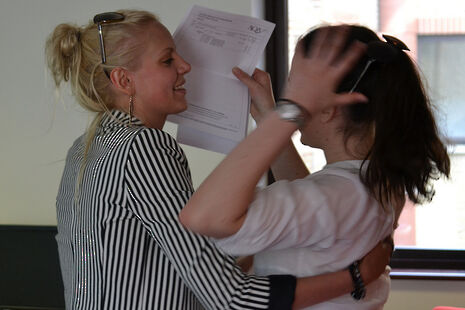Top A-level grades fall as university places increase
A year of “stable results” as the pass rate rises by 0.1 per cent and over 600,000 seek university places

This year sees record numbers of students achieving places at university, despite a dip in the number of top A-level grades awarded, as students across England, Wales and Northern Ireland collect their A-Levels.
A* and A grades were awarded to 25.9 per cent of entrants, a slight drop compared with last year. The overall pass rate has risen slightly, whilst the proportion of A*s received has remained level.
This year, a record 655,000 applicants are seeking university places, with over 400,000 confirmed so far.
In England, a government-imposed cap on the number of places has been lifted this year, prompting speculation that some universities might try to attract more students at the last minute.
Last year, the cap was raised by 30,000, increasing the number of university places on offer.
As a result, a greater number of universities began converting their conditional offers to students into unconditional offers before results day, a trend that has continued this year.
Those who fail to gain a place will enter ‘clearing’, a process whereby students can search for unfilled university places.
Cambridge does not participate in clearing, but those who do not make their offers may be placed in the summer pool and accepted by another college.
Results in the equivalent exams in Scotland, the Scottish Highers, have already been released.
There were a record 156,000 passes across Highers, up 5.5 per cent on last year.
The standard offer for a place to study at Cambridge is now A*A*A.
It had been anticipated that there would be a small dip in top grades, with a decrease in scores in humanities and sciences.
2014’s results saw A-Level pass rates drop for the first time in 32 years, with a decline in the number of students receiving A*s and As. However, last year saw an increase in proportion of students receiving A*s.
Ofqual’s chief executive, Glenys Stacey, had already announced a rise in pupils taking “traditional subjects”, as these are seen as “good currency” by sixth-formers seeking places in a highly competitive environment.
The ASCL head teachers' union thought it was "disappointing" to see a drop in subjects such as German and Design & Technology.
Head teachers blamed budget difficulties making it hard to maintain subjects with smaller numbers of pupils.
The British Council also stressed that the amount of pupils taking languages was “disappointingly low”, with a fall in pupils taking French this year.
Due to fears concerning marking, schools have urged students to challenge any marks they believe to be wrong.

Last week, it was reported that OCR nearly failed to issue its results in time due to problems with its marking system.
Ofqual has also questioned OCR’s “understanding” of marking.
Government ministers are so enraged by OCR’s failings that an option being considered is the scrapping of all independent exam boards, to be replaced with a single government body.
There are no exam boards in Scotland, which provides its Higher and Advanced Higher exams directly through the Scottish Qualifications Authority (SQA), the Scottish equivalent of Ofqual.
The significance of A Levels was put into question when PwC, rated the top graduate employer by The Sunday Times, announced it would disregard the qualification when assessing applicants.
This move was taken to try and prevent those from disadvantaged backgrounds missing out.
There has also been a call by a Bill Rammell, vice-chancellor of the University of Bedfordshire, for applications to be made once grades have already been received.
This follows research by UCAS, which shows that the majority of predicted grades given by teachers are incorrect.
 News / Night Climbers call for Cambridge to cut ties with Israel in new stunt15 April 2024
News / Night Climbers call for Cambridge to cut ties with Israel in new stunt15 April 2024 News / Police to stop searching for stolen Fitzwilliam jade17 April 2024
News / Police to stop searching for stolen Fitzwilliam jade17 April 2024 News / Cambridge University cancer hospital opposed by environmental agency12 April 2024
News / Cambridge University cancer hospital opposed by environmental agency12 April 2024 Interviews / In conversation with Dorothy Byrne1 March 2024
Interviews / In conversation with Dorothy Byrne1 March 2024 Interviews / ‘It fills you with a sense of awe’: the year abroad experience17 April 2024
Interviews / ‘It fills you with a sense of awe’: the year abroad experience17 April 2024



